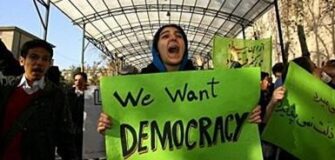Policy Shift Toward Iran Needed
Share

Policy Shift Toward Iran Needed
It must enable Iranians to topple the mullahs.
Patriot Post | Ken Blackwell | 12-23-2022
The young protesters who have been battling Iran’s ruling theocracy and ruthless security apparatus with bare hands for almost 100 days are unsung heroes. They have changed everything about Iran, a country that has been an enigma for every American administration in the past four decades. I don’t know if this was unpredictable or not, but it surely was not predicted by our diplomats and pundits. As we get closer to 2023, one thing is quite predictable: The nationwide protests in the Islamic Republic of Iran will be continuing into the New Year.
This raises the question of whether 2023 will open a new chapter for Iran, the region and the world — one that leaves Iran’s theocratic dictatorships as a relic of the past.
As former Secretary of State Mike Pompeo put it on December 17 when speaking at a conference hosted by the Organization of Iranian-American Communities, “Iran’s future does not lie with the radical theocratic regime that took power there in 1979. It lies with the brave protesters who have, for months, demanded basic freedom and called for an end to this regime.”
In today’s interrelated, news-averse world, major changes bring about major policy changes and vice versa. Yet, when it comes to Iran, notwithstanding lip services and symbolic sanctions and diplomatic gestures, one cannot discern a major policy shift. And that is where some soul-searching for the reasons behind the procrastination can be helpful.
As William Shakespeare famously wrote, “What’s past is prologue.” In understanding Iran today and adopting a correct policy, several features of the uprising are very telling.
The perseverance of the protests indicates there ought to be some kind of organization behind it. As Pompeo underscored, “These protests are result of 40 years of organized opposition to Iran.” According to Maryam Rajavi, the person designated by the National Council of Resistance of Iran (NCRI) to serve as Iran’s transitional president following the mullahs’ overthrow, “The Iranian uprising has deep roots in four decades of people’s resistance against this regime.”
Since 2014, the People’s Mojahedin Organization of Iran or Mujahedin-e-Khalq (MEK), the main organization of the NCRI, has maintained an extensive network of “Resistance Units” all across Iran, and these have played a key role in the uprising that was sparked in mid-September by the death of 22-year-old Mahsa Amini at the hands of Tehran’s “morality police.”
This is significant since, as former Senator Joseph Lieberman put it during a Washington, DC, summit on December 17, “The organization gives us confidence that the current regime will be overthrown, and most importantly, that when it is there will be leaders ready to guide Iran smoothly into its free and democratic future.”
The participating protesters are deeply aware and see a bright future ahead of them. As former Secretary of State Mike Pompeo pointed out at the same conference, the protesters have rejected not only the regime and its dictatorship in its entirety, but also the notion of returning to another. They want freedom. No wonder that one of the more prevalent slogans of protesters has been, “Down with the oppressor,” be it the Shah or the leader (i.e., Ali Khamenei).
What is taking place in Iran is more than protests; it is a revolution.
Lieberman suggested that policymakers in the United States and beyond should “start calling [the uprising] what it is: a revolution to liberate the people of Iran from the totalitarian government that has enslaved them for too many years.” But of course, doing so would indicate recognition of that revolution as something that is deserving of Western support, and that in turn would have certain policy implications.
The U.S. and Europe should embrace those implications and change their policies dramatically and quickly. More than 700 protesters have been killed and more than 30,000 have been arrested. Earlier this month, Iran’s judiciary began implementing death sentences for some of those arrestees, and concern is growing that the regime might resort to another massacre. The enduring potential for such a crackdown is reinforced by a sense of impunity that Iranian officials have developed in the face of permissive and often conciliatory Western policies.
Robert Menendez, the chairman of the Senate Foreign Affairs Committee, highlighted the urgency of addressing this impunity in a recent conference organized by the Iranian Diaspora and addressed virtually by Mrs. Rajavi.
“Let us keep standing up to the regime’s human rights violations and violence… Let’s keep fighting the senseless repression of women and girls,” Menendez said. “Let’s keep the world’s eyes riveted on Tehran’s ruthlessness, because if we’re in it together and we stick to our shared American democratic values and principles, I believe there is nothing we cannot achieve here and for the Iranian people in Iran.”
It is incumbent on the U.S. to recognize the legitimacy of the fight that young Iranians are engaged in against the regime’s evil, terrorist forces. The United Kingdom and the European Union should follow the American example by designating Iran’s hardline paramilitary, the Islamic Revolutionary Guard Corps, as a terrorist organization, based in part on its role in crackdowns on recent uprisings.
The brave Iranians have vowed to hold ground and pay the price of freedom with their resistance and blood. The year 2023 can be the dawn for a new chapter in the history of Iran, the Middle East and the world, should Western governments have the courage to take practical steps to support them.
https://patriotpost.us/opinion/93757-policy-shift-toward-iran-needed-2022-12-23
